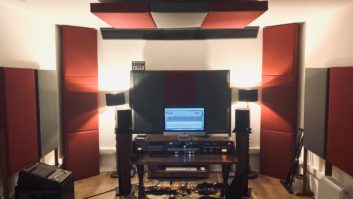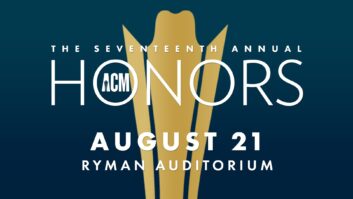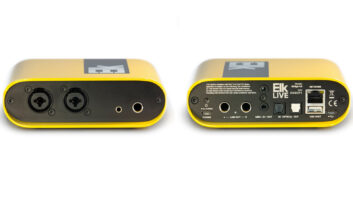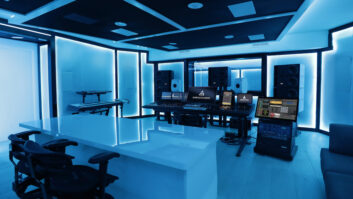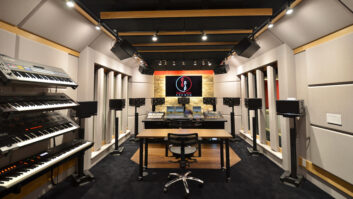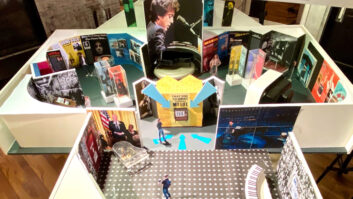
New York, NY (May 22, 2020)—Roddy Ricch was in the middle of a victory lap. The 21-year-old rapper’s bottled-lightning single “The Box” was on its way to its 10th week at No. 1 on the Billboard Hot 100 chart after completing his 20-date The Anti-Social Tour in February. His ubiquity was rising when suddenly the world was put on a pandemic pause. Live Nation and AEG suspended all their tours on March 12 and Ricch’s calendar suddenly opened up. He wouldn’t be touring in the near future.
Ricch bounced around a few recording studios in Los Angeles for a bit with his recording engineer, Chris Dennis, but the pair eventually realized the world was moving on COVID Time no matter where they went. “[Recording studios] were having issues getting groceries and other daily necessities,” said Dennis. “Once the city implemented social distancing, they were only allowed to book out one room at a time and keep it down to six people.”

Many studios across the nation are faced with similar restrictions. “With recording studios, you’re in a very close environment,” said Bill Jabr, owner of Blue Room West and South Recording Studios, based in Los Angeles and Atlanta. “You can limit the crowds of people in there, but you’re still in very close quarters. They’re not the most ventilated rooms. It’s easy for those to be bad places.” Now with most states still maintaining stay-at-home orders, many studios are sitting empty as artists do what millions of other Americans have been forced to do—work from home—with recording studios materializing in rapper living rooms and Airbnbs.
Reopening Live Music Right, Right Now
Hit Mogul Podcast Goes with the Workflow
Library of Congress Unveils Citizen DJ
By the end of March, Ricch and Dennis had set up a home studio in the living room of Ricch’s L.A. home centered around a Universal Audio Apollo Twin interface, Redco Audio Little Red Cue Box, Yamaha HS8 studio monitors and Sony C800G microphone. In the first two weeks, Dennis estimates, the quarantine-focused MC pumped out more than 45 songs.
While a global pandemic forced Ricch and Dennis out of the studio, the pair first discussed recording hip-hop at home last August, months before the first confirmed coronavirus case in America, because they noticed a shift in how their fellow artists were recording hip-hop. “We were definitely seeing more people working from home, and that sort of forced us to get a home setup like other artists,” Dennis said. “You’re going to start seeing artists not book out big studios as much. For us, we’ll probably be working more from home even after this is over.”

Many in the hip-hop industry are embracing home-recording options now that the studios are closed and the tour money is drying up. YBN Cordae was just two months removed from attending his first-ever Grammy Awards as a two-time nominee when he and his recording engineer BrenOnTheBoards had to set up shop at Cordae’s home this spring. To create his music, Bren outfitted the space with both Yamaha HS8 and ADAM Audio AX8 studio monitors, a Neumann u87 mic, and Avalon VT-737sp and Universal Audio 1176AE in the rack.
Young Thug and his YSL Records moved his favorite recording studio in Los Angeles into three separate Airbnbs and cranked out Slime & B, a collaboration mixtape with Chris Brown, under quarantine.
While artists are finding ways to flourish, some studios are struggling. Over the last three years, Don Q, Oun P, Lil Durk, Neek Bucks and even Golden Globe Award-winning actresses have come to record at Tha Warehouse Studios in Bronx, NY, co-owned by rappers Moe Peezly and K. Sims. That’s kept the studio busy, but as co-owner Erik Pena pointed out, the studio’s bills reach upwards of $6,000 each month and they haven’t paused while the world has had to. He estimated the facility lost income in the five figures for March and April. On top of that, the partners made a sizeable investment in a second studio room that was planned to open in early March, before the pandemic—a room that has added little more than bills so far.
As a result, Pena had to make the cautious decision to reopen Tha Warehouse in late April, but with some fundamental changes to operations. The studio allows recording just three days a week and is selective about who is able to record, extending time only to clients who are longtime friends of the facility. There’s also been reduced occupancy in the studio, with a maximum of three people per session. Clients are required to bring hand sanitizer and engineers are tasked with cleaning their station with Clorox wipes after every session.

“This is going to exist past June, especially in New York City,” said Pena. “I have to keep these rules, and as a result, my studio might be less popular. ‘No, you can’t come this deep into my studio. No, you cannot go in and out of my doors in the studio. Yes, you have to wash your hands.’ I’m going to keep my rules past June or whenever.”
Blue Room West and South • www.bluerecorders.com
Tha Warehouse • www.twhstudios.com
